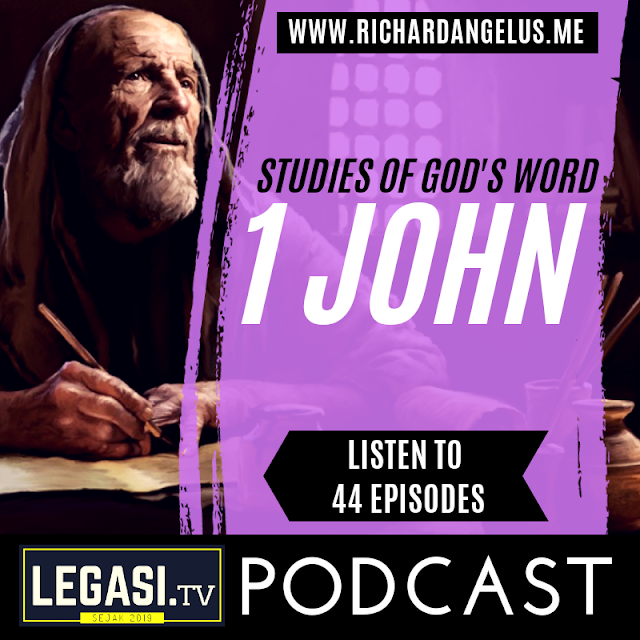As you glance through the Bible you will see that some of the
books (like the Psalms) are over a hundred pages long while others (like 2
John) are less than a page in length. 1 John is one which is not very long –
about 5-7 pages in most versions (like my J. B. Phillips’s New Testament
have 8 pages only). But this short book – a letter or an epistle – is packed
with a great deal of vital information about our faith and many helpful
guidelines regarding how to live as followers of Jesus Christ. Yes, 1 John
(or the First Letter of John) is for Christ’s disciples not for non-Christians.
But before we begin our study of 1 John, let’s consider a few important
questions:
Who Wrote It and Why?
In the early Church, there was general agreement that the Apostle John wrote the
letter (not John the Baptist!). For one thing, the subjects, style and wording
of 1 John are like those in the Gospel of John. Also, the writer of 1 John
claims to have been an eyewitness to the death and the resurrection of Jesus
Christ, our Lord (see 1 John 1:1,3 and 4:14). Furthermore, the author of 2 and
2 John refers to himself as “the elder.” These two letters, along with 1 John,
have usually been thought to have been written by the same author. Often in his
later years, John was called “the Elder.”
After serving for years as a disciple of Jesus, John spent a great deal of his time
writing the Gospel according to John (or the Gospel of John),
which describes the life and times of Jesus; 1, 2, 3 John which help
Christians understand what they should believe and do; and the Revelation,
in which he talks about the glorified and the second coming of Jesus.
We may tend to think or depicted Jesus’ disciples as saints who walked around
with halos over their heads. Nah! John was a man who was very much a human
being like the rest of us. Even though he talked often in his writings about love
and forgiveness, he evidently had a hot temper. At least, he was. Jesus once called
John and his brother James “sons of Thunder” (see Mark 3:17). One time, John
got so angry – maybe he was very jealous – that he wanted God to destroy a village
with fire, something Jesus refused to do (see Luke 9:51-56).
What Was the Setting?
In his later years, John settled in the city of Ephesus, a place where
Christians were struggling with the teachings of false teachers and were
tempted to leave their own faith. These false teachers or prophets denied that Jesus
was really God’s Son (see 1 John 2:22). These teachers were claiming to be “in
the light” but did not really care how they lived. They were unloving and sinful
even as they claimed “special knowledge” regarding God. These false
teachers were true liars, hypocrites!
In his own special way, John wrote a letter to his fellow believers (“my children”)
to try to reassure and strengthen them. He wrote this letter as elder (authority)
and as grandfather (relationship) to his children and grandchildren – a letter
packed with wisdom, advises, encouragements, helps, truths and warnings. John
was also concerned that the faith of some Christians was becoming more of a ritual
than something real and active. By the time John wrote this letter (about A.D. 92, shortly after writing his Gospel), the thrill of being
true believers in the early days of Christianity had begun to decrease but the
hype for spirituality increase. The commitment of some Christians had become
lukewarm rather than passionate. Many found it hard to stand up for their
beliefs and preferred “to belong to the world” (John 15:19).
Lord Jesus Himself had predicted this possibility, as well as the coming of
false teachers when He said: “Watch out that no one deceives you. For
many will come in my name, claiming: ‘I am the Christ,’ and will deceive many…
At that time many will turn away from the faith and will betray and hate each
other, and many false prophets will appear and deceive many people. Because of
the increase of wickedness, the love of most will grow cold, but he who stands
firm to the end will be saved” (Matthew 24:4-5, 10-13, NIV).
John counters two (2) major threads in the false
teachings of the heretics in this letter:
1) They denied the reality of sin. John says that if we continue in sin,
we can’t claim to belong to God. If we say we have no sin, we are only fooling
ourselves and refusing to accept the truth (1 John 1:6, 8, 10)
2) They denied that Jesus was the Messiah – God
in the flesh.
John said that if we believe that Jesus was God incarnate and trust him for our
salvation, we are children of God (1 John 2:22, 4:1-3)
[from Life Application Study Bible, NLT page
2015]
True in the time of John as it is today that the greatest
danger to the Church seemed to come from within, from people who claimed to
be believers but who were false teachers seeking to confuse the true believers
and lead them into damnable false teachings. Happened in our churches today?
Yes! Is 1 John irrelevant for today? Think again.
Now that we’ve identified who the author of 1 John was, why
he wrote it, and the setting in which it was written, let’s get started on what
I hope will be an exciting experience of growing, examining our beliefs, and
purified our faith in Jesus Christ, the Son of God, the Lord. Remember, It’s
All About Jesus.
CLICK TITLE to listen
or watch These Short Studies of 1st Epistle of John
THINK BIG. START
SMALL. GO DEEP.















